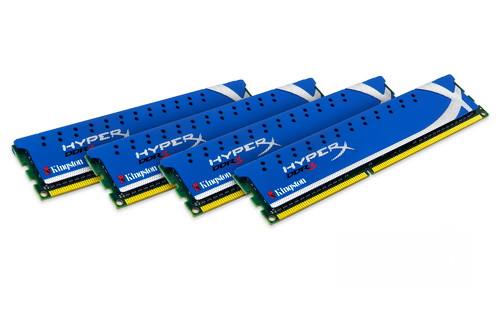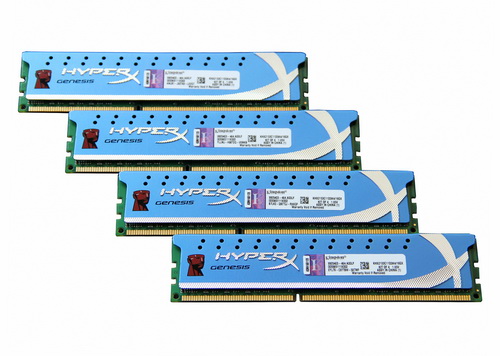INTRODUCTION

Many of you know that up until 5-6 months ago my favorite testing platform was the LGA1366 by Intel which was also the only platform with triple channel DDR3 support, something that played a huge part in my choice. Besides that's also why 3 out of my 4 test rigs featured Intel Core i7-920 (Bloomfield) CPUs each paired with 12GB of RAM (3x4GB). However all things come to an end eventually, especially when it comes to all things related with technology and so the launch of the latest Intel LGA2011 platform signified the upgrade of my primary test system. It did take a while until i finally managed to get the 2nd revision of the Core i7-3930k (Sandy Bridge-E) CPU to build the system but since that happened I’ve been putting all the latest Quad channel memory kits to hit the market through various tests to see just how good the new platform really is. So the very first Quad Channel DDR3 kit review to upload is about the latest and fastest Quad Kit manufactured by Kingston currently, the HyperX Genesis 16GB Kit running at 2133MHz with a CAS Latency of 11 (khx2133c11d3k4/16gx).
Kingston Technology Company, Inc. is the world’s independent memory leader. Founded in 1987 with a single product offering, Kingston® now offers more than 2,000 memory products that support nearly every device that uses memory, from computers, servers and printers to MP3 players, digital cameras and mobile phones. In 2009, the company's sales reached $4.1 billion. With global headquarters in Fountain Valley, California, Kingston employs more than 4,000 people worldwide. Regarded as one of the “Best Companies to Work for in America” by Fortune magazine, Kingston’s tenets of respect, loyalty, flexibility and integrity create an exemplary corporate culture. Kingston believes that investing in its people is essential, and each employee is a vital part of Kingston’s success. Kingston serves an international network of distributors, resellers, retailers and OEM customers on six continents. The company also provides contract manufacturing and supply chain management services for semiconductor manufacturers and system OEMs.
Kingston is amongst the countless companies with which I’ve been cooperating for a long time and because of that i have tested most of their products to date. That's one of the reasons as to why i can't wait to see if they will also introduce their high end HyperX T1 RAM kits into their Quad Channel range of products since the kit we have here with us today may be very fast but overall the HyperX Genesis line was never as fast as the HyperX T1 one. That aside we all (or at least most) know that 2133MHz is not really the speed ceiling for this particular platform so it should be quite interesting to see how much Kingston can push the envelope. Like i said however the default speed of 2133MHz is already very fast, how fast well follow us to find out.
SPECIFICATIONS AND FEATURES


PACKAGING AND CONTENTS
The HyperX Genesis kit arrived inside a small clamshell package with the Intel Core and Core i7 logos at the front right above a sticker with the name and basic specifications of the kit.
Inside the box you will find the 4 memory modules and the warranty & installation guide.
THE KHX2133C11D3K4/16GX KIT
The entire HyperX Genesis line features low profile gunmetal blue heatspreders. These may not look just as good as the ones of the HyperX T1 series but they have one strong point the T1 series lack, zero clearance issues with CPU Coolers.
Kingston has placed the HyperX logo on both sides, however only on one side do we see the Genesis logo.
A long sticker found on the rear side includes a variety of information such as the units serial number, product number, barcode, number of modules per kit and finally the required voltage.
TEST BED


Our primary test rig based on the Intel Core i7-3930k Rev.2 CPU and the Gigabyte X79-UD7 Mainboard will be used for this review.
TESTING METHODOLOGY


Whenever i test something which can be measured in terms of performance i always like comparing it with similar products just to see how well it stands its ground against them. However since this is the first Quad Channel kit i will be reviewing i can only compared it against Triple Channel kits which i have here with me. Ordinarily i would skip doing so since we are talking about different platforms/systems all together (LGA1366/LGA2011) but i do want to showcase how the latest Quad Channel technology compares to the previous one. So today i will be comparing the latest Kingston HyperX Genesis 16GB 2133MHz kit with the HyperX T1 6GB 2000MHz and the HyperX 12GB 2250MHz kits. Also since the XMP profile of the HyperX Genesis kit has a default command rate of 2 (the other two kits are running at 1T) i will also be performing tests with 1T to see just what more you safely can squeeze out of it in terms of performance without much effort and without increasing the voltage.
To give you the best and most accurate results possible we decided on using several methods including both benchmarking programs/suites and games. The benchmarking programs used are the well-known AID64 Extreme Engineer 2.3 version (formerly known as Everest Ultimate), the Sisoftware Sandra Pro 2012 version, the old but quite reliable ScienceMark 64Bit and the all-time classic SuperPi 1.5. Finally we needed a game with lots of fps (simply put) to better showcase and point any differences between kits so from now on we will be using a HAWX II timed demo in this kind of reviews. Every test was performed a total of 4 times after which the average result numbers were recorded into the charts. For all tests both CPUs (920/3930k) were overclocked at 4GHz in order to keep the results as accurate and fair as possible while the graphics card used in both systems is the Gainward GeForce GTX 590 Golden Sample.
AIDA64 EXTREME ENGINEER - SCIENCEMARK

As you can see the lower CAS Latency of the Triple Channel kits (CL9) along with their speeds (especially the 2250MHz one) allow them to pull ahead (surprisingly) from the Quad Channel kit in AIDA64.

The same exact image we saw with AIDA64 also applies to ScienceMark.
SISOFTWARE SANDRA PRO - SUPER PI

Sisoftware Sandra Pro measures performance in a different way than AIDA64 and thus it puts the Quad Channel kit in front of the Triple Ones by almost 50%.

Super PI also likes the new Quad Channel more than the previous Triple Channel and puts it ahead by almost 3 full seconds in the 4MB test.
HAWX II

The reason as to why I chose to have a benchmark of a game like HAWX II is because of the high frames rates achieved which allow us to pinpoint the differences between the available kits. So here we see a substantial difference in performance between the Triple Channel kits and the Quad Channel kit. Of course partially responsible for these results are also the different CPU/Mainboard combinations used with each kit (X58/X79).
CONCLUSION

Comparing triple channel kits with a quad channel kit was not really how i wanted to kick off RAM reviews based on the latest Intel X79 platform (LGA2011) since i don't quite consider it as fair but aside the fact that we got to compare the two latest channel types by Intel yet another good thing did come out of this and that's the indirect comparison between the previous LGA1366 and the latest LGA2011 socket. True this review has nowhere near the amount of benchmarks needed to successfully compare these two platforms but HAWX II did provide some interesting results proving that the CPU/Mainboard/RAM combo may not be as insignificant when it comes to games as some people believe. Certainly as mentioned in the beginning the HyperX Genesis line was never the fastest one in the Kingston inventory and with a speed of 2133MHz and a CAS Latency of 11 that's not hard to understand. Still it is extremely easy for anyone to change the default command rate from 2T to 1T and gain even more performance from the kit without having to overclock it something which was proven in our tests. I also did try overclocking the modules but raising the voltage simply to gain a few MHz over the default speed (could be a mainboard restriction) is not something i recommend and that's why i decided on skipping that part.
The HyperX Genesis line by Kingston always featured two strong points, the first is the already mentioned zero CPU Cooler clearance issues (something many others have) while the second is their attractive price tag which for the KHX2133C11D3K4/16GX is currently set at USD159.99 inside the USA (Newegg) and at 160Euros inside the EU. Personally i can't wait to see faster Quad Channel memory kits by Kingston but until then the HyperX Genesis 16GB 2133 CL11 kit is not only blazing fast (should cover the needs of 99% of the people out there) and has zero clearance issues with even the largest CPU Coolers but it's also quite aggressively priced and so because of all the above we are awarding it with our Platinum award, until the T1 series kit makes its appearance that is.

PROS
- Quality
- Low Profile Heatspreders
- Quad Channel
- Performance
- 16GB
- XMP Profiles
- Price (For Some)
CONS
- The X79 Platform Supports Faster Speeds

 O-Sense
O-Sense













.png)

